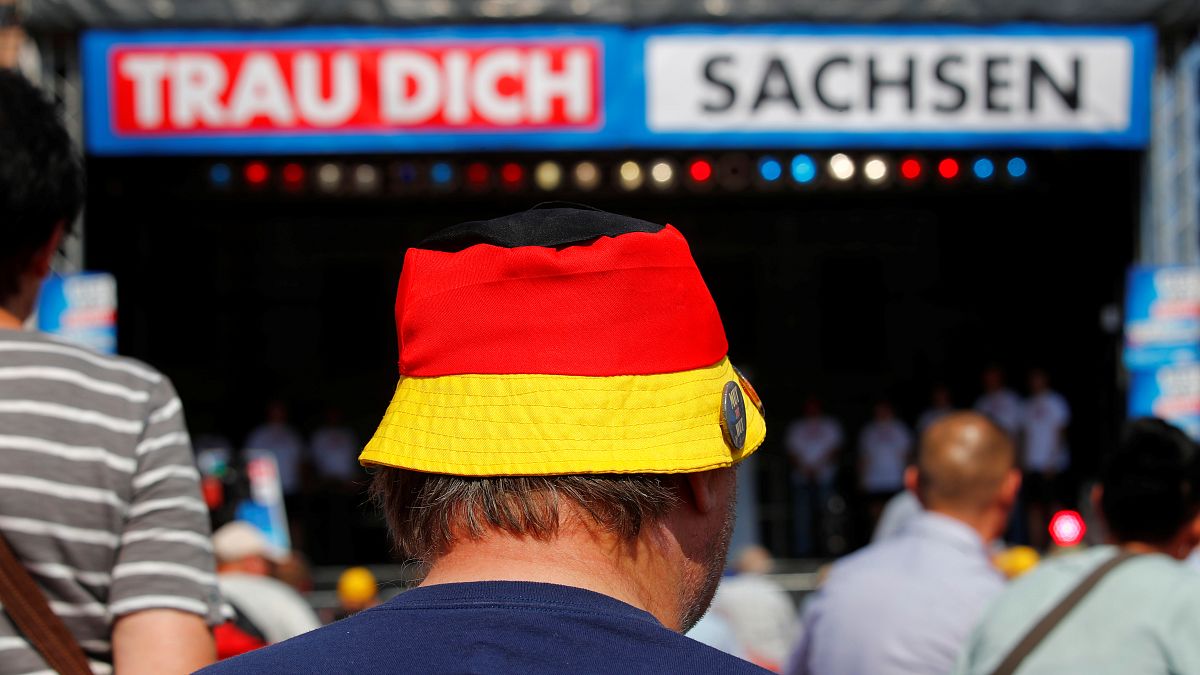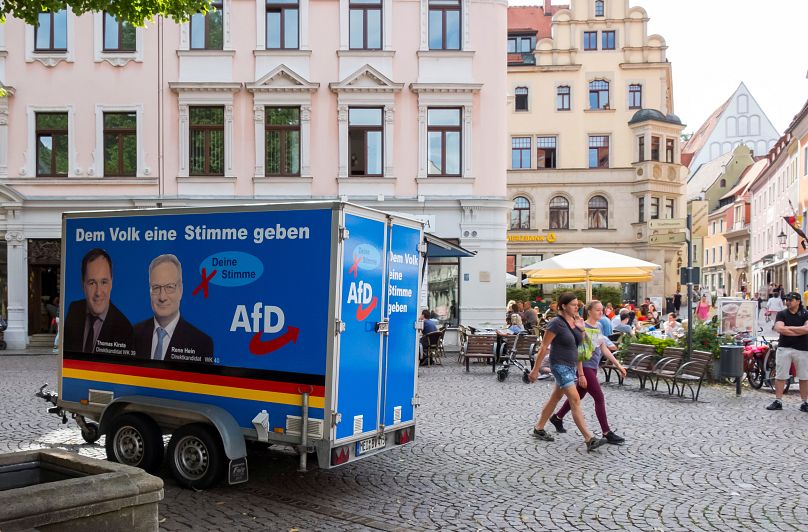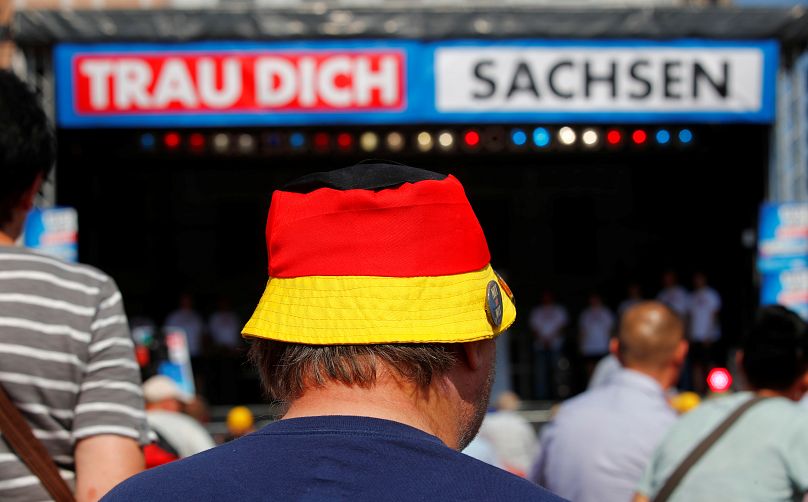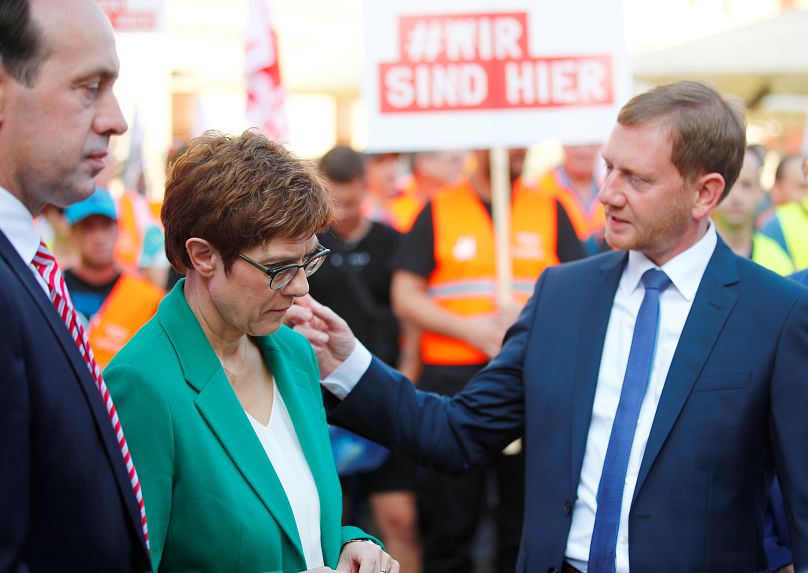"It is possible these two results shake up the political system nationwide. But if the SBD stays in power in Bradenburg and the CDU stays in power in Saxony, this could be, as we say in German, a storm in a water bottle (storm in a teacup)."
As Brandenburg and Saxony head to the polls in elections on Sunday, all eyes will be on how the far-right Alternative for Germany (AfD) party performs in the eastern states.
"It is possible these two results shake up the political system nationwide," Olaf Boehnke, Berlin Director & Senior Advisor at Rasmussen Global, told Euronews.
Here's why.
If for the first time in German history, AfD wins in state elections, it will send shockwaves to Berlin where the so-called "grand coalition" between Angela Merkel’s Christian Democrats (CDU/CSU) and the centre-left Social Democrats (SPD) is already on shaky ground.
Saxony, home to four million inhabitants where 3.3 million are entitled to vote, less than a year ago saw the worst far-right riots in Germany for decades. They were triggered by the murder of 35-year-old resident Daniel Hillig.
Read more: German court convicts Syrian over the stabbing that triggered Chemnitz riots
In Brandenburg, the state surrounding Berlin where two million of its citizens are eligible to vote on Sunday, the AfD has made waves over its use of campaign posters.
One of the party's slogans for these state elections is "Wende 2.0". Wende ("turnaround" in German) refers to the collapse of East German communism when the Berlin Wall fell in 1989 and the country was reunified a year later.
Many have slammed the party for allegedly appropriating German history for their own gain.
Read more: German far-right invokes 1989 spirit to woo voters in the east
Why is the AfD expected to win ground?
The AfD has done in Germany "what all populists across Europe have been doing successfully, including Trump and Farage," according to Boehnke.
"While the moderate and left try to sell hope, populists deal in fear," he said.
Boehnke said there is a cross-section of German society who are not the typical poor, working-class but with a good income, who "reached a point a couple of years ago where they didn't believe in the political system as it is anymore".
The AfD benefitted from this mood, which is particularly strong in eastern Germany, by saying: "You are losers, everyone betrayed you, now they are letting migrants into the country but we will give you the good old days back," he added.
In the formerly communist eastern states, three decades after the country's reunification, many voters still feel left behind and disadvantaged compared to the West, he cited as the catalyst for this feeling.
Boehnke said social media played a huge role in the AfD gaining more support when it became more popular because many of these "people stopped believing in the objectivity of news".
"They stopped reading public news and rely on social media, like YouTube or Facebook, as their only sources of information," he said.
"The algorithms of these social platforms, as we know, work as such that the more you read specific news content, the more they offer you from this the more they offer you from this kind of source."
In many East German cities and communities, AfD politicians are prevalent in local politics and in many cases, they are figures who enjoy local prestige.
The party has concentrated on being in touch with people "on the ground," according to Boehnke, which means in some smaller villages and towns in the East, AfD posters are the only ones that have been put up.
What is the current situation in the two states?
Brandenburg is governed by a so-called red-red coalition consisting of the SPD, whose politician Dietmar Woidke has been prime minister since 2013, and the radical Left Party.
In the 2014 state elections, the SPD performed best gaining 31.9% of the vote, followed by the CDU with 23%, the Left with 18.6%, the AfD with 12.2% and the Greens with 6.2%. Voter turnout in 2014 was only 47.9%.
Saxony has a grand coalition of CDU and SPD, lead by CDU politician Michael Kretschmer who took charge in 2017 after the previous prime minister Stanislaw Tillich resigned when the AfD won more votes than the CDU in the federal elections.
In the 2014 state elections, the CDU garnered 39.4% of votes, the Left won the second-most seats with 18.9%, ahead of the SPD’s 12.4%, followed by the AfD with 9.7%, and the Greens with 5.7%.
What do the latest polls say?
Just days from election day, the SPD and AfD are neck and neck in Brandenburg, according to pollsters.
Losing the state, which the SPD has run since German reunification in 1990, would intensify calls within the party for it to quit Merkel’s coalition and to rebuild in opposition following a nationwide slump in its support to below 15%.
It is expected that the SPD and Left Party may start talks with the Greens to form a red-red-green coalition after the election.
In Saxony, the CDU is still ahead despite a drop in the polls and has caught up with the AfD in recent weeks.
Since the fall of communism, the state has been ruled by CDU prime ministers, so has been considered the "home" of Christian Democrats.
However, the party's coalition partners, the SPD, have fallen further and further behind the Left and Greens in recent polls.



